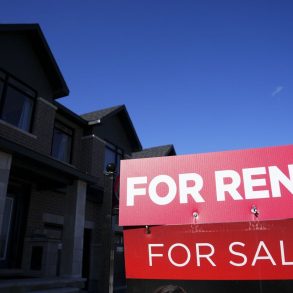Canada’s average home price remained at a historic high in November as housing inventory remains at historic lows.
The average sale price in the month was $603,000, 13.8% from a year earlier, according to data released by the Canadian Real Estate Association (CREA). Removing the high-priced markets of Toronto and Vancouver, the national average price was $481,000, up 19% from a year ago.
Sales, meanwhile, edged back 1.6% from November but were still up 32.1% year-over-year.

“If I had to sum up the Canadian housing story in 2020, I would say it’s gone from weakness because of COVID to strength despite COVID,” CREA’s senior economist Shaun Cathcart said in a release.
“It will be a photo finish, but it’s looking like 2020 will be a record year for home sales in Canada despite historically low supply. We’re almost in 2021, and market conditions nationally are the tightest they have ever been and sales activity continues to set records.”
One of the biggest drivers of the home price increases—aside from the delayed spring housing market and record-low mortgage rates—has been historically low housing supply. Inventory fell to a record low of 2.4 months in November, meaning this is how long it would take to liquidate current inventories at the current sales rate. CREA noted that 21 Ontario markets were under one month of inventory, up from 18 markets in October.
Here’s a look at how some regional and local housing markets performed in November:
- Woodstock-Ingersoll, ON: $466,600 (+28.4%)
- Quinte & District, ON: $402,700 (+28.2%)
- Ottawa: $540,500 (+22.4%)
- Halifax: $393,461 (+15.7%)
- Barrie & District: 598,000 (+23.5%)
- Greater Montreal Area: $423,400 (+17.5%)
- Greater Toronto Area: $902,500 (+10.6%)
- Winnipeg: $286,500 (+7.1)
- Greater Vancouver Area: $1,044,000 (+5.8%)
- Victoria: $730,200 (+4.9%)
- Calgary: $418,700 (+1.4%)
The national sales-to-new listings ratio remained high at 74.8%, just off its record high of 77% set in September.
Reaction to November’s Housing Market
“Sellers clearly maintain a strong hand in negotiating prices, except those selling downtown condo units who are facing substantial competition,” wrote Robert Hogue of RBC Economics. “Soaring supply caused condo prices to plateau since the start of the pandemic in the Greater Toronto region and Vancouver with declines seen in some downtown locations. We expect prices to weaken further in the near term.”
Observers note that single-family housing units continue to show the most strength, posting year-over-year price growth of 14.1% vs. just 4.8% for condos.
“Nine months since the pandemic’s arrival in Canada, homebuyers continue to demonstrate a preference for housing units with more space and, in some cases, that are further away from city centres,” economists from Scotiabank wrote.
The Road Ahead
The big question on everyone’s minds is whether this momentum in the housing market carries into 2021, or if activity finally begins to recede.
“We suspect that reduced mobility and economic activity related to COVID-19’s second wave will translate into a further slowing of residential real estate transactions momentum in the next few months,” Scotiabank’s economists noted. “The effects of the softer population growth witnessed this year due to border closures may also contribute to more modest real estate activity in 2021.” Although they noted supply-demand tightness is likely to “bolster home prices over the near term.”
Hogue, meanwhile, foresees an acceleration in Canada’s economic recovery due to the start of vaccinations and—eventually—an easing of restrictions, which he says will benefit the country’s housing market.
“Still, a high degree of uncertainty will persist for some time,” he added. “We see both upside and downside risks depending on how work-from-home trends, interest rates, immigration, mortgage payment deferrals and COVID-19’s second wave unfold.”







